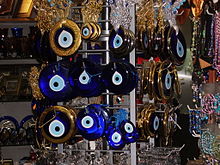
Back Oogkraal Afrikaans Qotaz Azerbaijani Назар (амулет) Byelorussian Назар BE-X-OLD Назар Bulgarian Nazar BS Nazar (amulet) Catalan Nazar (amulet) Czech Nazar-Amulett German Nazar (amuleto) Spanish


An eye bead or naẓar (from Arabic نَظَر [ˈnaðˤar], meaning 'sight', 'surveillance', 'attention', and other related concepts) is an eye-shaped amulet believed by many to protect against the evil eye. The term is also used in Azerbaijani, Bengali, Hebrew, Hindi–Urdu, Kurdish, Pashto, Persian, Punjabi, Turkish and other languages.[1] In Turkey, it is known by the name nazar boncuğu[2] (the latter word being a derivative of boncuk, "bead" in Turkic, and the former borrowed from Arabic), in Greece is known as máti (μάτι, 'eye'). In Persian and Afghan folklore, it is called a cheshm nazar (Persian: چشم نظر) or nazar qurbāni (نظرقربانی).[3] In India and Pakistan, the Hindi-Urdu slogan chashm-e-baddoor is used to ward off the evil eye.[4] In the Indian subcontinent, the phrase nazar lag gai is used to indicate that one has been affected by the evil eye.[5][6][7]
The nazar was added to Unicode as U+1F9FF 🧿 NAZAR AMULET in 2018.[8]
- ^ Khan, Abdul Jamil (2006). Urdu/Hindi: An Artificial Divide: African Heritage, Mesopotamian Roots, Indian Culture & British Colonialism. Algora Publishing. p. 138. ISBN 9780875864389.
Arabic verbs have generated an enormous number of words for Urdu/Hindi as well as Persian. ... The word nazar, meaning eye, or sight, is part of the cultural idiom -- <nazar lag jana>, meaning 'evil eye's effect,' and is used in the whole subcontinent.
- ^ Williams, Victoria (2016). Celebrating Life Customs Around the World: From Baby Showers to Funerlan, p.344. ABC-CLIO. ISBN 9781440836596. "nazar boncugu".
- ^ M. Moin: A Persian Dictionary, 3rd edition, p. 4752 (in Persian).
- ^ South Asian Cinema, Volume 1, Issue 1. South Asian Cinema Foundation. 2001. p. 61.
- ^ Mehmet Kaan Kaya, Arun D Singh, Harminder S Dua (22 May 2009). "Nazar boncugu—blue glass Evil Eye bead". British Journal of Ophthalmology. 93 (707). Retrieved 13 May 2019.
The phrases "Nazar lag gai" (affected by the Evil Eye) and "Nazar utarna" (removing the effects of Evil Eye) are common in Hindu culture.
{{cite journal}}: CS1 maint: multiple names: authors list (link) - ^ Fallon, S.W. (1879). A New Hindustani-English Dictionary, p.1164. Lazarus. [ISBN unspecified]. "nazar lagānā, v. a. To cast an evil eye upon; to regard with evil intent. [by an evil eye.
nazar lagnā, yā khānā, v. n. To be influenced" - ^ Clark-Decès, Isabelle; ed. (2011). A Companion to the Anthropology of India, p.228. Wiley. ISBN 9781405198929. "nazar lagana".
- ^ "🧿 Nazar Amulet Emoji". Emojipedia.
© MMXXIII Rich X Search. We shall prevail. All rights reserved. Rich X Search